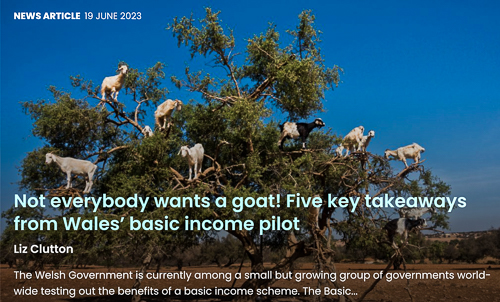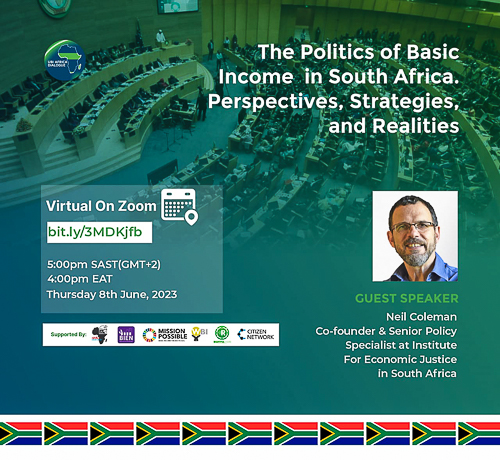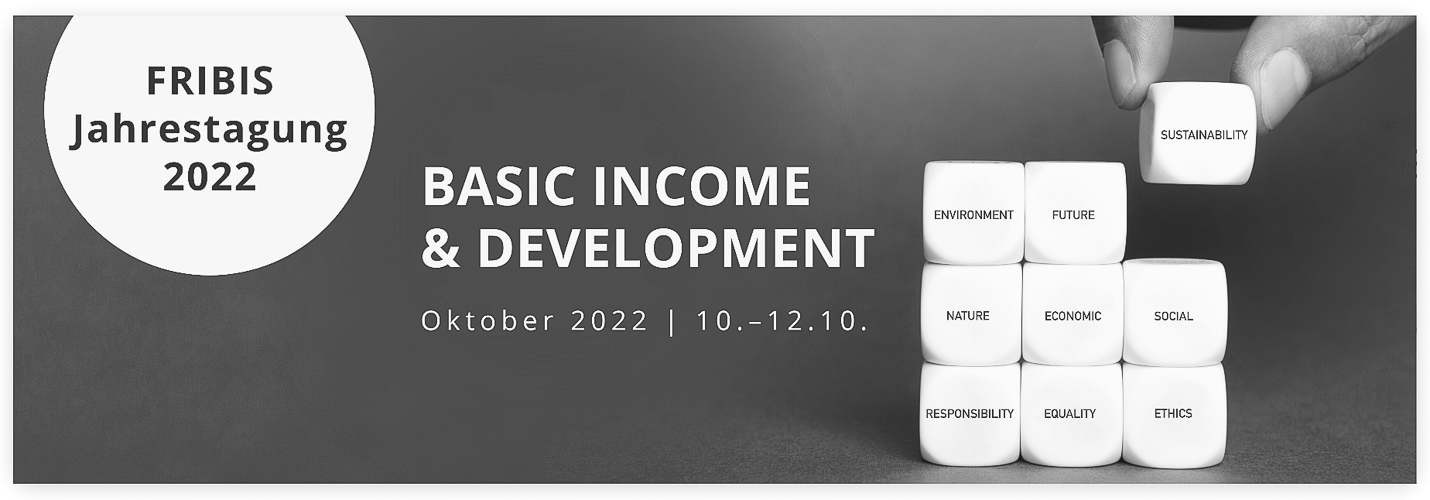
by Guest Contributor | Aug 14, 2023 | News
by Kelle Howson and Neil Coleman
The Institute for Economic Justice
On 27 July 2023, a group of civil society organizations in South Africa launched a major social security litigation that has the South African government’s Ministry of Social Development and the South African Social Security Agency (SASSA) as its respondents. The action aims to advance the constitutional right to social assistance for all, by compelling the government to address serious issues of exclusion and erosion in a vital pandemic-era cash transfer scheme.
The litigation is part of broader efforts to secure a universal basic income in South Africa.
Read more here.

by Peter Knight | Jun 22, 2023 | Events, News
The Wales Centre for Public Policy (WCPP) were commissioned by Welsh Government officials, to hold a conference for academics working in the fields of basic income and children’s social care. The conference was held virtually on December 15th 2022 and was well attended by 70 academics.
WCPP has made available a highlights pack (see links at the end of this article) during the week commencing Monday 19th June 2023. The highlights pack includes
- An overview of the event
- Links to videos of keynote speakers, including video messages from
- the Minister for Social Justice and Chief Whip and the Deputy Minister for Social Services
- An outline of the contributions from speakers including a video recording
- A summary of the questions to speakers
- Discussion
- Resources and biographies
Purpose of event:
The purpose of the event was to enable the Welsh Government to draw upon the best available research evidence about the implementation and impact of basic income schemes and wider support for care leavers. The event aimed to provide opportunities for discussion of;
- The Basic Income for Care Leavers in Wales pilot and the evaluation that the Welsh Government has commissioned;
- Key lessons from other research on basic income schemes;
- Ways to support or strengthen the Welsh Government evaluation; and
- Additional policies that could complement the Basic Income Pilot Scheme and increase its impact.
Speakers:
Chaired by Professor Steve Martin (WCPP), the conference included contributions from
- Sir Professor Michael Marmot
- Professor Sally Holland, David Westlake (CASCADE),
- Professor Guy Standing,
- Dr Miriam Laker – Oketta (Give Directly),
- Hannah Webster (Royal Society of Arts),
- Dr Eleanor Ott (Centre for Evidence and Implementation).
Discussion:
The conference was positively received by the academic community and provided Welsh Government Officials with insight from academics on the approach to evaluating the pilot. On the whole the audience were very positive both towards the pilot and the research and evaluation programme supporting it. It provided a strong endorsement of the approach which the Welsh Government is taking.
Key messages included the need for greater qualitative data and the benefit of creative and participatory methods. This was planned and has since been addressed by adding a new in-depth qualitative research using ethnographic methods module to the evaluation contract.
Other key points included the need for meaningful and ethical participation, this has been at the forefront of the evaluation since its inception. Furthermore, delegates pointed to the importance of building a legacy for the evaluation and using information that is already available to researchers. Useful pointers and personal connections were achieved and Welsh Government Officials are working with the evaluators (CASCADE) to provide a longer term research framework.
For an article on Five Key Takeaways from the conference, click here.
To download a Powerpoint presentation complete with live links to multiple resources including videos of speaker presentations, click here.
To view a pdf of the Powerpoint presentation without live links, click here.

by Peter Knight | Jun 1, 2023 | Events, News
On 8 June 2003 you can participate in a Zoom webinar entitled “The Politics of Basic Income in South Africa: Perspectives, Strategies, and Realities” sponsored by BIEN and four other organizations.The webinar will begin at 17:00 SAST (GMT+2) and feature as Guest Speaker Neil Coleman, Co-Founder & Senior Policy Specialist at the Institute for Economic Justice in South Africa.
To register click here.

by Guest Contributor | Jan 19, 2023 | Events, News
Guest Contributor: Jeffery J. Smith, co-founder of the US Green Party and author of the play
Thomas Paine—not Tom Paine as his detractors addressed him—added his voice to the chorus of prominent thinkers calling for an extra income for everyone sourced from ground rent. In the 18th century, Paine’s was a popular voice, inspiring revolt everywhere. His opponents dubbed his career “the Age of Paine”.
Leading reformers advanced “physiocracy” (nature’s rule). To them, it was obvious that the distribution of natural rent created class, decided one’s wealth vs one’s poverty, and conferred political power as consistently as a natural law. Physiocrats dominated debate in the three nations where Paine promoted justice.
In France, Quesnay and Turgot formulated “l’impot unique” (the single tax) on land. Mirabeau the Elder prophesied their discovery would be a “social advance equal to the inventions of writing and money.” (The equal of fire, too?) Voltaire’s character Candide declared, “The fruits of the earth are a common heritage of all, to which each man has equal right.” Rousseau added, “You are undone if you once forget that the fruits of the earth belong to us all, and the earth itself to no one.” The first French Republic used land rent exclusively until the cost of war impelled them to tax commerce, too.
In Britain, Adam Smith wrote, “Ground rents seem a more proper subject of peculiar taxation.” William Blackstone judged “The earth, therefore, and all things therein, are the general property of all mankind.”
In America, two famous friends of Paine shared the same belief. Thomas Jefferson: “Everyone may have land to labor for himself may exact for it such compensation as not only to afford a comfortable subsistence, but wherewith to provide for a cessation from labor in old age.” Benjamin Franklin, bankrupted by his speculation in land (bailed out by friends), converted to physiocracy. Today, the US Social Security Administration recognizes Paine’s proposal as the precursor of the Social Security pension.
Paine’s Common Sense spurred the American colonies to rebel, his American Crisis kept them at it while the war went against them. For these achievements—plus Rights of Man, Age of Reason, and Agrarian Justice—the US Congress bestows the Thomas Paine Award upon authors of clear, inspiring political prose.
In our era, it’d not be books but other media that’d shift a popular paradigm, likely entertainment media. Recall how Gandhi helped the anti-nuclear weapons movement, what Malcolm X did for civil rights, what Milk did for gay marriage, etc. A movie about Paine could do the same for an extra income for all.
A step toward the silver screen is a new stage play, Tom Paine’s Bones, which unlike previous attempts, relates his exciting life—he faced death seven times—in order to reveal his humanitarian ethics as a way to convey his geonomic policies. That is, entertain to enlighten.
To bring the play to your town and enjoy a night at the theater, please get in touch. To help make its premiere in Portland Oregon a success, join the crowd funding campaign. Thanks for you consideration.

by Peter Knight | Oct 4, 2022 | Events, News
Basic income has become the subject of a lively and controversial debate in politics, civil society and academia. By questioning the fundamental assumptions of our social interaction, it challenges us to redefine the way we want to live together. At Basic Income and Development, this year’s FRIBIS’ annual conference, we will be taking a closer look at the relationship between basic income and development ideas and the potential they hold for the challenges of both the present and the future.
For decades globalization and neoliberal economic policies have driven social and ecological crises worldwide. The ongoing climate change has not only lead to environmental disasters, but is also causing social crises. The increasing social and economic inequality is resulting in social polarization and increasing support for populist parties. And, as more and more public goods and services have been privatized in favour of economic growth, the risks in the wake of the various global crises have become collective problems. At the same time standards for the management of natural resources and the natural living environment are lacking, as are norms and values for labour markets, health policy and crisis prevention. We also lack sustainable means and mechanisms to establish social, ecological and economic justice.
Given these challenges, we want to explore the extent to which basic income can help to overcome crises and create new perspectives. Could a basic income help us to use environmental resources more sustainably, preserve biodiverse habitats and make social communities more resilient? Would it help people in (post-)conflict regions to build or secure social peace? Or would it rather have the opposite effect, as some critics suggest? What are the potentials and risks of a basic income for development practices in the Global South, and how does this/do they relate to concepts of redistribution and justice? These and other questions will be addressed at this year’s FRIBIS annual conference.
Visit the conference website here.






